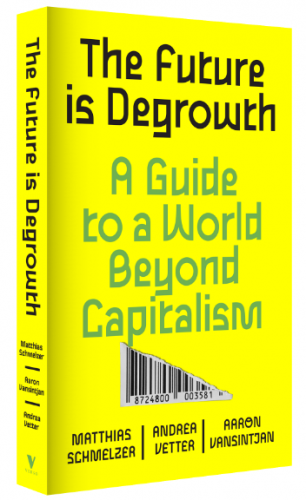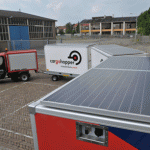Quoted from: Schmelzer, Matthias, Andrea Vetter, and Aaron Vansintjan. The Future is Degrowth: A Guide to a World Beyond Capitalism. Verso Books, 2022.
 These days, with growing interest in degrowth, it seems that almost every other week another humourless columnist for a major newspaper writes a criticism of degrowth. This is to be expected and even, to a certain extent, welcomed: the more those in positions of power rail against degrowth, the more people who might be sympathetic to it, who would otherwise not have heard about it, are exposed to it.
These days, with growing interest in degrowth, it seems that almost every other week another humourless columnist for a major newspaper writes a criticism of degrowth. This is to be expected and even, to a certain extent, welcomed: the more those in positions of power rail against degrowth, the more people who might be sympathetic to it, who would otherwise not have heard about it, are exposed to it.
And, indeed, it also fulfils degrowth’s initial goal as a provocation, a conversation starter, a shit-disturber. Yet, usually, these columnists show little understanding of what degrowth means – and so their objections tend to badly miss the mark.
One common misconception is that degrowth is either a proposal for recession, imposed austerity, or that it will necessarily result in economic collapse and social catastrophe. Since economic growth is seen as the only possible way to improve living standards, whenever an economic crisis happens, critics of degrowth will say, often disingenuously, ‘see, this is what happens when you degrow’. And, since our economy depends on economic growth, and economic crisis is catastrophic for many people’s livelihoods, people assume that degrowth would similarly be a catastrophe and lead to full-scale collapse. Both assumptions are, of course, false.
Degrowth is the opposite of recession: recessions are unintentional, while degrowth is planned and intentional; recessions make inequality worse, degrowth seeks to reduce it; recessions typically lead to cuts in public services while degrowth is about de-commodifying essential goods and services; recessions often cause bold policies for sustainability to be abandoned for the sake of restarting growth, while degrowth is explicitly for a rapid and decisive transformation. Hence the slogan of the French décroissance movement: ‘Their recession is not our degrowth’.
Such a transformed, just, and growth-independent economy is the core of the degrowth project. Further, degrowth is explicitly framed to build a system not structurally bent towards crisis. Crises like the 2008 financial crisis, the coronavirus pandemic, the fires engulfing the Amazon, and the past and ongoing genocide of Indigenous peoples indicate that growth-driven capitalism already is a catastrophe. More than ever, the choice is between degrowth – a multidimensional set of transformations based on sufficiency, care, and justice – or barbarism. In other words, we talk about degrowth in order to avoid the catastrophe that awaits us and which is already a daily reality in many parts of the world. Degrowth is not the crisis; capitalism is… Degrowth is not against progress; rather, holding on to continuous economic growth undermines real progress.
Schmelzer, Matthias, Andrea Vetter, and Aaron Vansintjan. The Future is Degrowth: A Guide to a World Beyond Capitalism. Verso Books, 2022.





